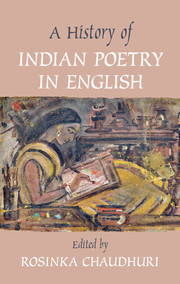Book contents
- Frontmatter
- Contents
- Contributors
- Acknowledgments
- Introduction
- SECTION I THE BROAD NINETEENTH CENTURY: INDIANS IN ENGLISH AND THE ENGLISH IN INDIA
- 1 The First Indian Poet in English: Henry Louis Vivian Derozio
- 2 English Poetry in India: The Early Years
- 3 From Albion's Exile to India's Prodigal Son: The English Poetry of Michael Madhusudan Datta (1824–1873)
- 4 Transforming Late Romanticism, Transforming Home: Women Poets in Colonial India
- 5 The Locations and Dislocations of Toru and Aru Dutt
- 6 Poetry of the Everyday: Comic Verse in the Nineteenth Century
- 7 Toru Dutt and “An Eurasian Poet”
- 8 Rabindranath Translated to Tagore: Gitanjali Song Offerings (1912)
- SECTION II PUBLISHERS, PUBLISHING HOUSES, AND THE PERIODICAL PRESS
- SECTION III POETRY: 1950–2000
- SECTION IV POETS OF THE DIASPORA
- SECTION V THE NEW MILLENNIUM POETS ON THEMSELVES
- Bibliography
- Index
1 - The First Indian Poet in English: Henry Louis Vivian Derozio
from SECTION I - THE BROAD NINETEENTH CENTURY: INDIANS IN ENGLISH AND THE ENGLISH IN INDIA
Published online by Cambridge University Press: 05 March 2016
- Frontmatter
- Contents
- Contributors
- Acknowledgments
- Introduction
- SECTION I THE BROAD NINETEENTH CENTURY: INDIANS IN ENGLISH AND THE ENGLISH IN INDIA
- 1 The First Indian Poet in English: Henry Louis Vivian Derozio
- 2 English Poetry in India: The Early Years
- 3 From Albion's Exile to India's Prodigal Son: The English Poetry of Michael Madhusudan Datta (1824–1873)
- 4 Transforming Late Romanticism, Transforming Home: Women Poets in Colonial India
- 5 The Locations and Dislocations of Toru and Aru Dutt
- 6 Poetry of the Everyday: Comic Verse in the Nineteenth Century
- 7 Toru Dutt and “An Eurasian Poet”
- 8 Rabindranath Translated to Tagore: Gitanjali Song Offerings (1912)
- SECTION II PUBLISHERS, PUBLISHING HOUSES, AND THE PERIODICAL PRESS
- SECTION III POETRY: 1950–2000
- SECTION IV POETS OF THE DIASPORA
- SECTION V THE NEW MILLENNIUM POETS ON THEMSELVES
- Bibliography
- Index
Summary
Born, and educated in India, and at the age of eighteen [the author] ventures to present himself as a candidate for poetic fame.
“Poetic fame” is a particular kind of fame, one that is poeticized, romanticized. It does more than make the poet known; it makes the poet known as a poet, a figure possessed of a particular cultural privilege in the nineteenth century. Rooted in anxiety over the devaluation of poetry brought on by the expansion and diversification of the reading public, poetic fame became a matter of legitimacy as well as popularity. In the particular context of Calcutta, it meant distinction within a burgeoning public sphere, one which existed “on a par with London as a center of publication through the 1860s.” To achieve poetic fame within such a context meant, according to the Romantic ideology of the period, to transcend that very context, to exist above and outside the cultural field.
Thus, when the Calcutta-born Henry Louis Vivian Derozio announces in the preface to his 1827 Poems his candidacy for poetic fame, he makes a claim for acknowledgment as a singular figure. This version of Derozio seems to have been taken up by his earliest and most enthusiastic reviewers, who singled him out as the first “national poet” of India (D 399) and the “beginning of a literary era.” Of course, such assessments invite scrutiny, as the search for the origins of Anglophone Indian poetry raises ideologically fraught questions about authenticity. What qualifies Derozio to stand as a representative of India? Is it the fact that, unlike earlier Anglophone poets living in India, he was born there? Or is it the trace of native ancestry in the “Eurasian” poet of primarily English and Portuguese descent? Indeed, is it even possible to speak of a national poet of India in the 1820s, decades before the rise of coherent nationalist movements in the region?
- Type
- Chapter
- Information
- A History of Indian Poetry in English , pp. 21 - 31Publisher: Cambridge University PressPrint publication year: 2016



